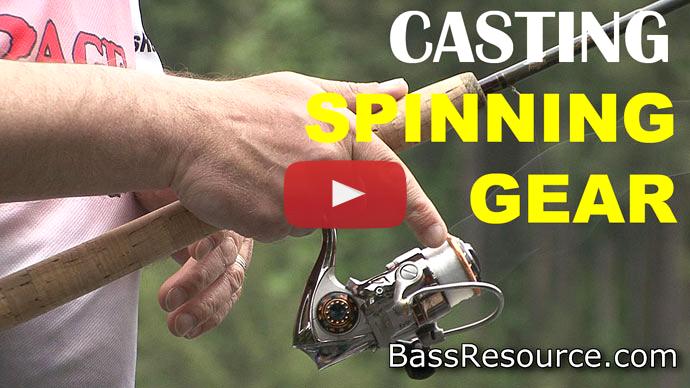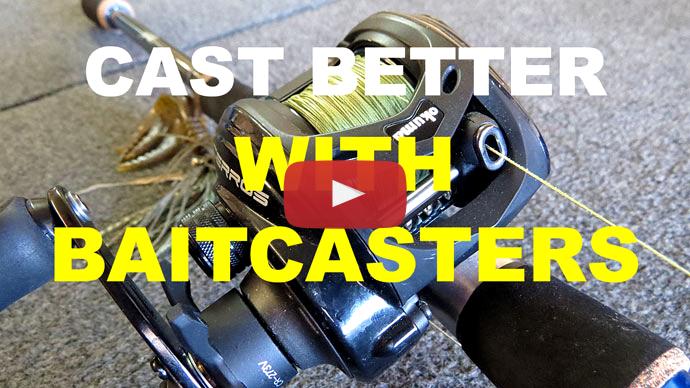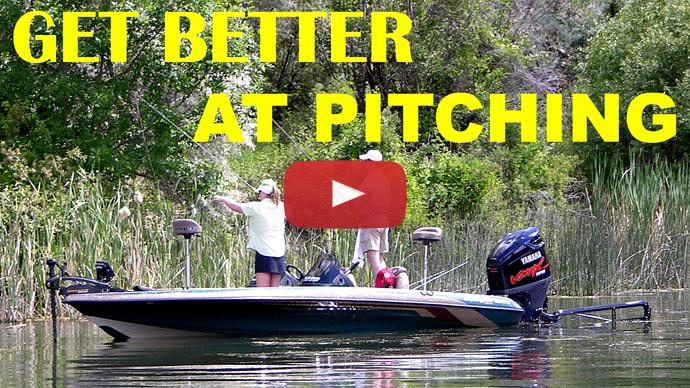All right, so you want to improve your casting distance and accuracy. Yeah, you do. I've heard this by a lot of people ask this all the time. How can you improve casting accuracy and distance? So let's talk about some of that things.
First of all, let's talk about the main thing you can do, the number one thing you can do to improve your casting ability, and that's to practice. Now what I mean by that, the thing about bass fishing, pretty much everything you do and how to do stuff is on the water. But casting, you can do it off the water. So do it in your backyard or go to a park if you don't have access to a backyard. But I remember doing this when I was a kid. My dad set up paper plates out in the backyard or cans. And you just target. You just practice over and over and over, casting at that target, getting better and better at it. And you move it at different locations, further away.
The more you do that, the idea is to be consistent and just keep doing it until you can get on that plate every time at different distances. Once you get that, then you wanna take it up a notch, and the way to do that is to try to get it to land on the paper plate without bouncing. That's really hard to do, especially if you're doing an overhand cast. But the minimal amount of bouncing is what you want. You control that with your thumb as it gets close to the plate. You lift up on the rod tip a little bit while giving it some more thumb to slow it down, and you can get it to land with very little bounce.
That translates to a nice quiet entry when you're on the water with your baits. And a lot of times, that's the difference between catching fish or not. If you can get a subtle entry into the water, that'll intrigue the bass instead of scaring them. Because if you're making this big cast up in the air, boom, big splash down, it's like you're throwing rocks at them. Now, my father nowadays when we go fishing, he's like, "Well, I'm getting their attention." I'm like, "Well, how many fish have you caught so far? Yeah, it's not so much." So you want that subtle entry.
It's the same thing with flipping and pitching. You can practice that, again, same technique, same way of doing it. And you can also do that indoors. So when the weather's really bad, maybe it's the middle of winter, you can be in your basement, your living room, and you can pitch and flip underneath your couch, under your chair, set up targets, set a can on its side, try to get it right inside the can. Again, the idea is to get it so it doesn't drop really hard, don't bounce. You want a real nice plop and it doesn't bounce.
Another thing you can do when you're practicing is find something to stand up on, to mimic being on the deck of a boat or on the bank. It's really hard when you're doing flipping and pitching, especially when you're on the ground, the nose, the tip of the rod can hit the ground. So stand up on something. If you're outdoors in a park, find a park bench, find a picnic table and stand up on that. Or if you're in the house, maybe a bucket, be careful, or get up on a chair or something like that, a ladder, something to get you up off the ground a little bit and imitate what it's like to be on the bank or on a boat. That can really help. It makes a big difference. So that's like the first thing you do, just practice, practice, practice.
There's nothing... I know a lot of pros, and I'm not trying to boast here. It's just the nature of the work I do. Every single one of them, man, they are amazing at casting. It blows me away. I mean, what they can do. I'm like, wow. The reason to me is this repetition, repetition, repetition. Every single one of them will tell you that they have done a lot of practicing off the water to get as good as they are. Every last one of them to a tee will tell you that. That is the critical component to getting better at casting. But there's other things you can do.
Distance, you want more distance. Well, yeah, you can try to throw really hard, but what that usually ends up is a nice bird dust if you're using bait casting outfit. You can use spinning. That helps, spinning gets out further. But when you're talking about bait casting gear, one of the key things is to back off on the brakes a lot. Going back to these pros I told you about, they had the brakes completely off. Completely off. It took me a while to figure this one out. I was like, these guys can really bomb it out there. And I didn't realize that they didn't have the brakes off. And I was watching their techniques and trying to figure it out.
Until one time I got the privilege and the honor of being on Hank Parker's show and fishing with Hank Parker. And we were fishing a submerged roadbed way out in the middle of this lake, with crankbaits and he was bombing them way out there. And I kept backing off of my brakes and backing off on them and trying to make the same cast and I just couldn't do it. I had backed off as much as I could without getting a backlash and I still couldn't get the distance he was doing. And it wasn't because he was, you know, putting a lot of muscle behind it.
Hank: I got a little fish on my crankbait. There you go. We're out here cranking a roadbed that I thought we'd be catching a lot more fish on. We've caught a few. Not what I thought we'd catch and it's a good place to catch a big one. We hadn't done that yet. We're not giving up.
Glenn: I finally asked him, like, "What is going on?" Well, he had the brakes completely off. And that goes back to your practice. Practice backing off on the brakes to the point where you can have the brakes off as much as you possibly can stand and then get better and better from there. The less brakes you have, the further distance you're gonna get. I mean, that's just pure physics. So and the less effort too. You don't have to throw as hard. So of a day of fishing, your arms and wrists, forearms are not gonna be as tired. I mean, my forearms were aching after that day with Hank Parker because I was trying to match him and it wasn't gonna work. It wasn't gonna happen. You know, he is who he is because of, you know, he's Hank. So that's the best way to get distance.
Another one is also with your rods, make sure you're using a medium-heavy power rod with a fast tip. You don't want a broomstick, like a heavy, heavy, heavy power, because it's just a stick with a slight...just the tip has flex. The more flex across the entire length of the rod will enable you to fling that bait out further. Use the rod to catapult that lure out there. If it's just a stick of a rod, you're gonna have a lot tougher time throwing it. Another quick tip is make sure you have the lure far enough hanging from the tip before you make the cast. If the lure is all the way up next to the tip or on the tip, you're not gonna get any distance out of it. So that's just another quick little tip to do.
Now for improving your casting accuracy. So yeah, again, going back to practice, that's going to help. But here's a quick tip. I was very fortunate that Stan Fagerstrom lived up in my area. Stan was known for a master caster. He was incredible. He actually did a lot of trick-casting shows. Just amazing what he could do with a rod and reel. And I was very fortunate that he's actually a member of my bass club for decades. And so I learned a lot from him. He's an amazing guy. And you know, he's, God rest his soul. But one of the things that he taught me as far as accuracy is concerned is if you really want to be spot on accurate is keep the rod tip, the rod in front of your face. When you make that cast, get the rod right in front of your face and line up with your target and then make your cast. Because casts are all wrist. It's not arm, it's wrist. So you can do it. right in front. Right?
It does a couple things. First of all, it lines up your target and you're better aimed at it. But also, if you bring your rod tip behind you, now your bait's swinging back here, your rod's back here, and that equates to...it's accentuated when you throw it in front of you, now you're gonna be off target. It's kind of like bowling. You know when you bowl and you bring your arm all the way back? You practice over and over again, not so much the forward swing, but it's the back swing. You want to make sure it's absolutely perfectly straight and the same every single time because if that's not right, then it's not going to be accurate when you bring your arm forward. And it's very similar with a rod. If you keep it right in front of you, you're not going to do that. So bring the rod right in front of you, line up, and just make that quick cast with a flick of the wrist, and you'll be surprised at how accurate your casts become.
One last thing I want to talk about is the equipment. Equipment has everything to do with about your casting distance and accuracy. If you want good distance, make sure your spool is filled up all the way on your reel. It needs to be full, not overfilled, but all the way full. A reel that's spooled all the way is going to cast further than one that's not. You're just gonna get better distance out of that. And you're matching your rod power with your lure so you don't have way too light of a lure or too heavy of a lure for the rod and reel that you're using. That can make a big difference with your casting accuracy and distance. So with these tips in mind, you're gonna go out and be a lot more accurate and you're gonna have that distance that you want. Now go out, hit the water, and have a lot of fun.



